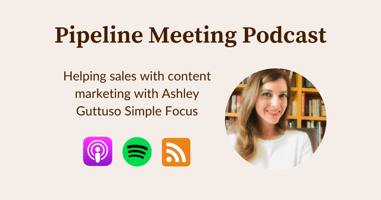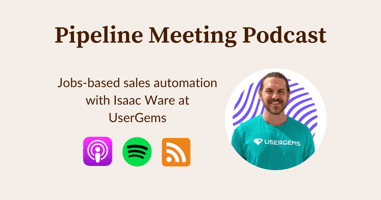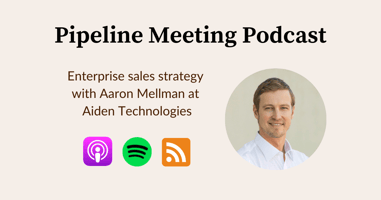Ashley Guttuso talks about how to do effective content marketing that helps sales teams be...
Getting senior fractional marketing help with Natalie B. Swan
Natalie B. Swan joins the pod to talk getting help when you're the head of marketing. Natalie shares examples of tasks big and small that can be taken off your plate. (Seriously!)
Show Description
Where B2B marketers come to talk sales. 15-minute interviews published every Monday and Wednesday morning. For heads of marketing and founders who support a sales team.
Subscribe
Popular Platforms
Apple Podcasts
Spotify
RSS Feed
Also available:
Amazon • Anghami • Castbox • Castro • Deezer • GoodPods • Google Podcasts • iHeart Radio • Overcast • Pandora • PlayerFM • Pocket Casts • Podcast Index • Podchaser • Stitcher • TuneIn
Show Notes
Natalie B. Swan joins the pod to talk getting help when you're the head of marketing. Natalie shares examples of tasks big and small that can be taken off your plate. (Seriously!)
She has been doing fractional marketing work since 2017 and has a lot of experience freeing up marketers to work on strategic projects by taking on important things that feel like they simply can't be done by anyone else.
Natalie shares drivers behind this, how it contrasts to working with freelancers through sites like Upwork and Fiverr, and speaks more broadly about the types of projects that tend to be successful.
Find Natalie B. Swan on LinkedIn: https://www.linkedin.com/in/nataliebswan/
Learn more about her business: https://swanandassociates.co/
Transcript
[00:00:00] Pipeline Meeting Intro
[00:00:00] Harris Kenny: Welcome to Pipeline Meeting where marketers come to talk about sales. I'm your host Harris, Kenny, and I'll be joined by guest every Monday and Wednesday for brief 15 minute interviews where we'll share tips that you can apply to support your sales team and help them close more deals.
[00:00:15] Harris Kenny: If you don't have time to listen to this whole episode, you can skip ahead in the show notes in your podcast player, or find the transcript at introcrm.com/podcast. All the episodes are published there.
[00:00:28] Fractional marketing services
[00:00:28] Natalie Swan: The way I see it is you have the Upworks and the Fivers of people that can very tactically execute. Which is great, right? You need someone to design ads for you. Okay. That's super specific.
[00:00:38] Natalie Swan: Or we have these very robust marketing agencies that tend to be high level strategy, and less execution support in some cases. whereas this is a marrying of those worlds.
[00:00:50] Harris Kenny: So I'm ahead of marketing. I've got my to-do list. I just had to maybe let go of contractors or people on my team, but I've still got these tasks in Asana or Trello or whatever, and now they've been assigned to me.
[00:01:04] Harris Kenny: And so I've got my tasks from before. I've got these bigger tasks. It sounds like if someone were to reach out to Natalie and say, okay, Natalie, can you help me?
[00:01:12] Harris Kenny: When they look at that list of tasks, there's entry level things, but it sounds like what you're saying is that you can get help with more complex projects, you can get someone to take those things off your plate. The strategic things that maybe you are putting off because it takes too much time, but you know that you won't have time to do it.
[00:01:30] Natalie Swan: exactly. And that is what then makes all of the tactic entry level stuff actually effective. Because as you know, and as the marketers who are listening to this know, Everyone wants to be a marketer, and so you're getting ideas from everyone on the team, from the company owner, from all of the above.
[00:01:51] Natalie Swan: You're keeping a master list of all of everyone's wonderful ideas, but there is no way that based on the resources that are available, that you can execute on everything and not only execute or not, but do it well. Make it actually work, and also be able to report back on that.
[00:02:07] Natalie Swan: And so you need that what are we trying to do? What are our priorities? To actually execute the things that make sense and leave the things that don't off of the plate for now, or leave it to the next quarter or whatever it is.
[00:02:20] Why experience matters
[00:02:20] Harris Kenny: that could probably also include things like reevaluating a tech stack or maybe migrating tools and thinking strategically about like what order to do this if we're trying to save money in a certain area in order to invest somewhere else. I mean, it sounds like these are the types of things where you couldn't go to an agency to do this, and you can't go to an Upwork or a freelancer marketplace.
[00:02:40] Harris Kenny: Would either have to go to someone like you or you're staying up at three in the morning trying to do it yourself and gut it out. Right. I mean, cause I, I don't understand how else we would do it.
[00:02:48] Natalie Swan: you need someone who has the marketing leadership background and the ability to be a strategic leader while also understanding the tactical execution and the operations that go into marketing.
[00:03:01] Natalie Swan: One or the other, you might get lucky, you might have a great whatever it is, lead magnet that takes off and does really well and people are interested in.
[00:03:09] Natalie Swan: But in terms of a scalable marketing machine and marketing and sales machine, you just can't do that well if you're trying to be everywhere. And if the people that are working as part of the, whoever is doing the marketing doesn't have the insight and the understanding of why are we doing this and how is it moving us forward in some way.
[00:03:32] An example success story
[00:03:32] Harris Kenny: You talk about on LinkedIn, strategic marketing playbooks and these sort of custom tools. Can you give an example of a project with a client where you brought this capability and what that looked like for them?
[00:03:43] Harris Kenny: This is, I think, different than how people think about getting help as marketers, can you share an example of a story of what that would look like.
[00:03:50] Natalie Swan: You say that it would be really hard to delegate some things and I agree with you. There are probably some things, but I've been doing this for years and it doesn't matter if the company is five people or 50 people, or 200 people, what marketing needs to be successful lives within a framework and lives within a, Hey, we know we need this information. We know we need to understand our customer deeply. We need to understand how their, what their path to purchase is, and how we are facilitating that along the way and how we're positioning ourselves, all of these very basic things.
[00:04:26] Natalie Swan: How that's looked for clients. One of my favorite client projects I worked on, I helped them with an internal go-to-market program launch, and we planned, I wanna say it was 15 events in a one month time period with less than two months of planning leading into that and it, in it, it included, I wanna say it was like 11 person team.
[00:04:49] Natalie Swan: There were custom installations. We were doing, it was in multiple locations and the goal was get in front of people and engage them.
[00:04:57] Natalie Swan: So that, as you can imagine, was a huge undertaking cuz we didn't have a lot of time to plan it. We wanted it to be extremely high quality and well done. So I was brought in to, to help facilitate all that and to say, this is how we're gonna focus.
[00:05:13] Natalie Swan: Creating all of the project plan and leading those meetings, creating plans for all of the team members who are part of it and what they needed to do logistically and where they needed to be. And bringing everyone along with what is our goal and why is this important?
[00:05:28] Natalie Swan: Cuz it was also a really big ask of the team members, like they were putting in extra hours. There were some cases where we were getting up very early in the morning to make this happen, and that's a much harder sell and it just doesn't work when people don't see the like, oh, this is really, this really makes a difference in terms of what we're trying to do.
[00:05:48] Natalie Swan: And I can understand why all these tactics and logistics are important because, We have this overall goal and uh, and it went super well. So yeah, does that answer your question?
[00:06:01] Avoiding putting off work
[00:06:01] Harris Kenny: That totally answers my question.
[00:06:03] Harris Kenny: Can you think of examples where a marketer or maybe more a founder was putting off a project, not because they don't have time, but because they're not familiar with it.
[00:06:16] Harris Kenny: Is a barrier that people have to overcome sometimes in working with someone like you admitting they don't know how to do something, and it's just like, Hey, maybe I, while I know a lot about marketing in general and maybe even several specific things like email marketing or trade shows, you know, I don't know a lot about social media platform or whatever, and how much of it is, or how often is it that you see people have to come to grips with that and say, okay, I'm just gonna bring in someone who maybe knows more about this specific thing than me. It's not just necessarily that you bring in more time and more capacity, but but also expertise and that there's some level of humility and saying, yeah, I really don't know about this even though I am running this show.
[00:07:00] Harris Kenny: I don't know about everything. How much is that psychology or emotional part of it? Do you know what I mean?
[00:07:05] Natalie Swan: I've been super fortunate with the clients that I've gotten to work with and, you know, my own marketing and sales process leads into that, right?
[00:07:16] Natalie Swan: I speak with people that look to me as a trusted advisor and someone that can come in and be really direct and make things happen and not be afraid to come into a situation and be a leader. Even if we've just met, or this is my first team meeting, like I've done this enough times to know when someone's gonna be a really good partner in that way.
[00:07:42] Natalie Swan: I'll give you an example. I've had some smaller projects where the first couple calls with the client, they're not really going about the process in the way that I recommend.
[00:07:53] Natalie Swan: And there's a lot of talking over in the meetings and things like that versus, Hey, we've hired you for a reason.
[00:08:00] Natalie Swan: Come in and we're excited to hit the ground running with you. And so I've just sort of learned how to look for those things. But there's a massive amount of people and a lot of them are solopreneurs and small and like micro business owners that are so intimidated by marketing that they just don't touch it at all.
[00:08:18] Natalie Swan: I see a really big opportunity for those people, especially as more people pursue side hustles or pursue this different style of work that you have to invest in marketing. And whether that's your time or your money or whatever it is, it's just a non-negotiable.
[00:08:36] Natalie Swan: Yes, it, it can be a barrier for people. And so I, any, you know, anyone that listens to this, I would encourage, learn marketing. Invest in your ability to learn marketing and find someone that you trust to help, guide you on that process. For sure.
[00:08:51] Where to start
[00:08:51] Harris Kenny: Okay. I think that's a really good transition to the founders and who may have even less background and maybe less familiarity, even though they have to on some level, know what they're doing a little bit in order to get their company off the ground.
[00:09:03] Harris Kenny: How do you help people think about where to start with marketing? So most B2B companies, our listeners tend to have relatively higher ticket items, and so there's gonna be a little bit of a sales cycle. There's a little bit of education. A lot of 'em are doing inbound on some level, so they're gonna have some basic things like a website and probably a LinkedIn profile and a personal in a company and whatever.
[00:09:23] Harris Kenny: But once you get past the basics, how do you help them think through which channels to test and focus on? How many channels are worth testing? At what point do you say, okay, we're just gonna do a couple of things. What do you think about that? Once you've got your legs under you a little bit, you've got some customers, how do you decide when to pick a couple and focus on 'em versus test a few different things out?
[00:09:45] Harris Kenny: And how does the customer you're serving play into that? Cuz I'm sure it depends on who your customer are, but how do you go from like, okay, you got, we went from sort of zero to one, but now you wanna go from like one to 10.
[00:09:56] Natalie Swan: Yeah, really good question and for that, I always start with what's working and how do we know? I know you're a big tech stack guy, people hear marketing data and conversion rate and all these things and people that aren't marketers get very intimidated by that. And they think that they just need this really built out thing and this dashboard that like lives in the sky with all these magic marketing numbers.
[00:10:22] Natalie Swan: But it can be so much simpler than that. And especially if you are at level one, then where are your customers coming from and where are they falling out of your process? I'm really big also on customer interviews and talking to people.
[00:10:36] Natalie Swan: When you're at that level, that should be a big part of your marketing and sales is having conversations and gathering verbatims and really understanding, why did this person purchase and how did they first hear about my business? And, what were their objections on the sales call?
[00:10:51] Natalie Swan: And really fine tuning that before trying to say, okay, well now we need, a full content engine. And we are trying to show up everywhere and we're maybe hiring someone to post a couple times a week.
[00:11:05] Natalie Swan: Like that just might not be super effective because, You're again trying to do too many things and why would you not start with what's already working well and go deeper into that.
[00:11:18] Harris Kenny: I love that. All right. What didn't we cover? What did we miss? What else is on your mind?
[00:11:23] Rethinking what needs to be done
[00:11:23] Natalie Swan: So much of work is being rethought and when you bring in someone that is at a high level and has several years of experience in their area of expertise, do you really need someone doing that for 40 plus hours a week?
[00:11:39] Natalie Swan: How effective could it be to have someone that's just there for a handful of hours, x number of hours to help you get that up and running and then bring in someone that can keep it going?
[00:11:52] Natalie Swan: Right? then can then keep the lights on , and that's, that's really what I do for clients is I work myself out of a job eventually and on a lot of. I've been brought in for, we have a campaign, we need you here for three months. What ends up happening is I come in and really enjoy being part of the team, and the client extends the contract for a year.
[00:12:12] Natalie Swan: It really gives you this opportunity to sort of vet how it is to work with someone and get really good momentum with them without having to feel, I need to go to a hiring agency or I need to drop everything and get a really high level person in here and pay them a six figure salary.
[00:12:33] Natalie Swan: It's a fun way of operating,
[00:12:36] Harris Kenny: That's great. I think there's a lot to that. And it's interesting. I think you, yeah, you set up the systems and then they get familiar and they find more opportunities. It seems really smart to me. The model makes sense when you're talking about it too. The, uh, how much, how much do you really need? How much time do you really need?
[00:12:51] Harris Kenny: It's the whole like preto principle, right? 80 20 rule where if for 20% of the time we can get 80% of the results from this, is that good enough for right now to get us to the next level? Probably. Or maybe.
[00:13:02] Natalie Swan: Probably, yeah. In, in, uh, every case that I've worked a part of, yes. I'll say that.
[00:13:09] Harris Kenny: All right. Seeking exceptions to the rule. If folks are really interested in learning more about you and your work, where can they find you online?
[00:13:15] Follow Natalie B. Swan
[00:13:15] Natalie Swan: I would love to connect on LinkedIn. I'm Natalie b Swan there and they can also check out my website, which is just natalie b swan.com.
[00:13:22] Pipline Meeting Outro
[00:13:22] Harris Kenny: That's all for now. You can find show notes at intro crm.com/podcast. The theme music for Pipeline Meeting is by Neighbourhood Vandal. If you learned something, consider sharing this show with a friend. Thanks for listening.



